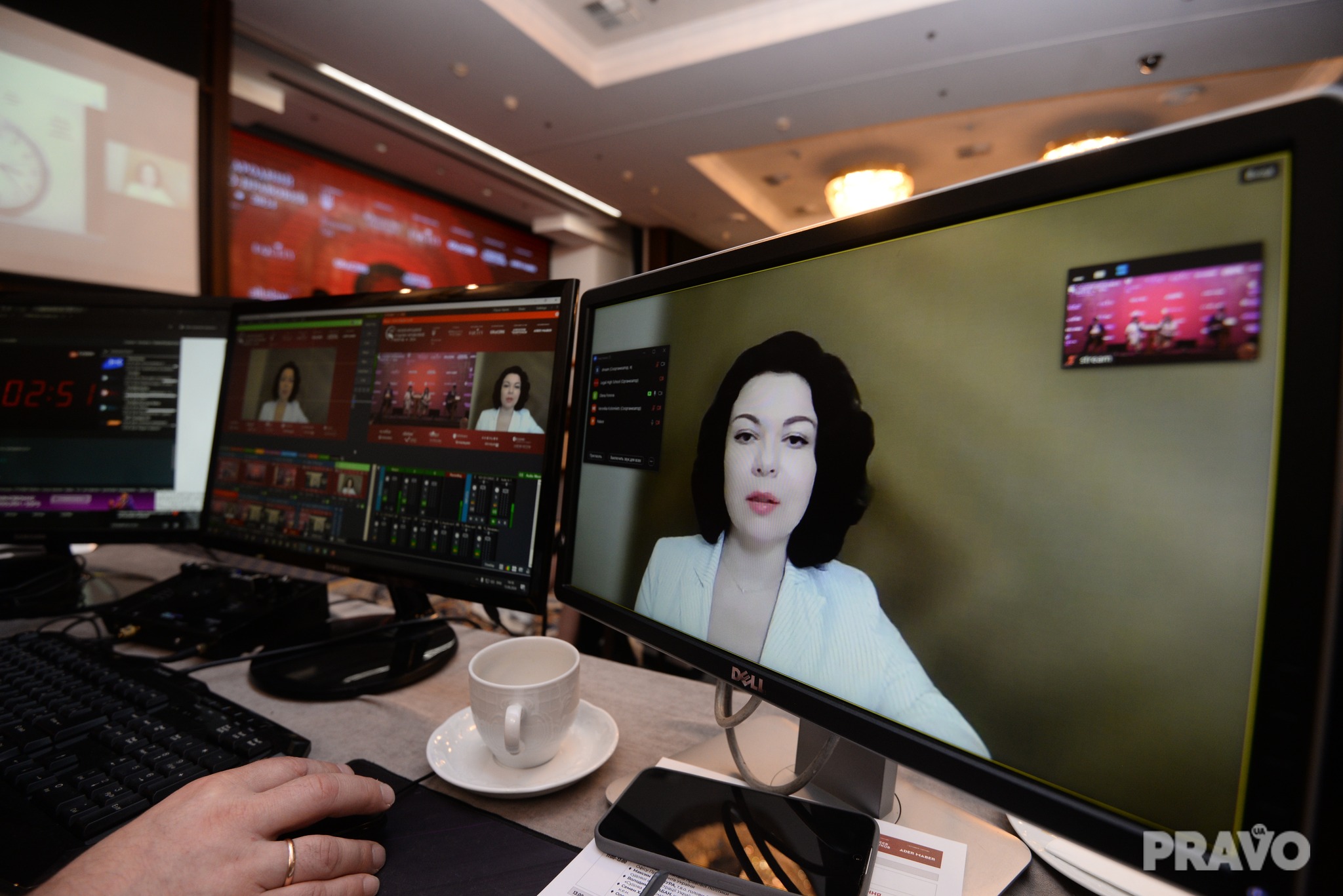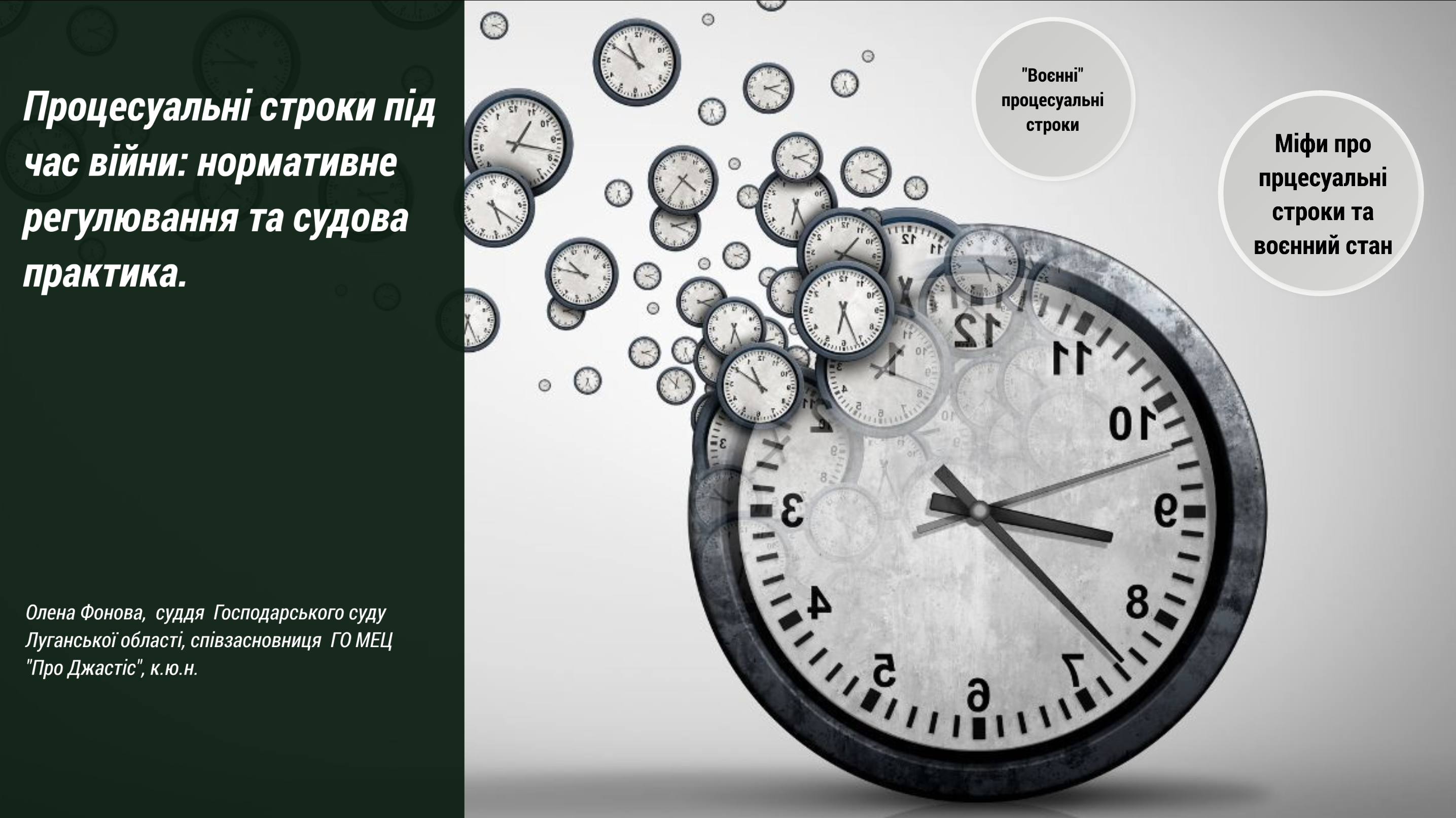The first day of the XII International Judicial and Legal Forum, organized by Yurydychna Praktyka Publishing House, has successfully concluded in Kyiv. This event is a significant event for the legal community, as it brings together leading experts in the field of law and justice.  Photo from Yurydychna Praktyka The second session of the forum was devoted to a topical issue – wartime justice. One of the reports of the session was a presentation by Olena Fonova, Deputy Chairman of the Board of the NGO CMC “Pro Justice”, a judge-speaker of the Economic Court of Luhansk region, PhD in Law. She delivered a presentation on “Procedural deadlines during the war: regulatory framework and court practice“, which is extremely important in the context of conducting court proceedings under martial law.
Photo from Yurydychna Praktyka The second session of the forum was devoted to a topical issue – wartime justice. One of the reports of the session was a presentation by Olena Fonova, Deputy Chairman of the Board of the NGO CMC “Pro Justice”, a judge-speaker of the Economic Court of Luhansk region, PhD in Law. She delivered a presentation on “Procedural deadlines during the war: regulatory framework and court practice“, which is extremely important in the context of conducting court proceedings under martial law.  In her report, Olena Fonova focused on the adaptation of procedural legislation to the conditions of martial law. She discussed how procedural deadlines can be renewed or extended in cases where military circumstances prevent compliance and tried to dispel certain myths related to the renewal and extension of procedural deadlines. Myth 1 – martial law is the basis for the renewal of procedural deadlines. The mere fact that martial law has been imposed in Ukraine is not a ground for renewal of the procedural term. Such a ground may be circumstances that arose as a result of the introduction of martial law and made it impossible for a party to the trial to perform procedural actions within the prescribed time limit (Resolution of the Supreme Court of Ukraine of 10.11.2022 in case 990/115/22). Myth 2 – volunteer activity is a ground for renewal of the procedural term. Carrying out volunteer activities is not an indisputable and absolute evidence of the validity of the reasons for missing the deadline for appealing a court decision due to the fact that the volunteer voluntarily carries out socially oriented non-profit activities by providing volunteer assistance, which is subjective to him/her and does not indicate the existence of objectively insurmountable reasons for not filing a properly executed appeal within the time limit established by law (Resolution of the Supreme Economic Court of Ukraine of 11.12.2023 in case No. 913/785/17). Myth 3 – a party’s filing of a motion to extend the deadline obliges the court to automatically extend the deadline. The fact that a party has filed a motion to restore the deadline does not automatically oblige the court to restore this deadline, since the motion to restore the deadline for filing an appeal, in view of the provisions of Article 256 of the Code of Civil Procedure of Ukraine, must contain a justification for the validity of the missed deadline. Valid circumstances are those that are objectively insurmountable, do not depend on the will of the party and are associated with actual significant obstacles or difficulties for the performance of procedural actions. (Resolution of the Supreme Economic Court of Ukraine of 05.07.2023 in case No. 910/185/21). Myth 4 – Indication of legal norms, citation of legislative acts and/or legal positions is sufficient justification for recognizing valid reasons for missing a procedural deadline. The mere reference to the relevant article and to bylaws and regulations, as well as the citation of legislative and other acts, do not indicate that the person (applicant, complainant) is raising the issue of time limits extension before the court. Indication of legal norms, quotes from legislative acts and/or legal positions are not identical to the indication/justification of circumstances and do not serve as grounds for recognizing valid reasons for missing the procedural deadline (Resolution of the Supreme Economic Court of Ukraine of 05.07.2023 in case No. 910/185/21). Myth 5 – postponement of the preparatory hearing in the case until the end of the period of martial law. The suspension of proceedings, unlike the postponement of the case (postponement of the preparatory hearing), is carried out without specifying a time limit, until the circumstances that led to the suspension of proceedings are eliminated. The court of first instance postponed the preparatory hearing without specifying a time limit, until the circumstances that led to the postponement of the preparatory hearing were eliminated (until the end of the period of martial law). In other words, the court of first instance effectively suspended the proceedings. Such rulings may be appealed to the Court of Appeal (Resolution of the Supreme Economic Court of Ukraine dated 07.12.2022 in case No. 908/859/22). Myth No. 6 – 15 years is not a period for refusing to renew the procedural term. The panel of judges notes that the appeal in this case was filed with a significant delay (more than 15 years), the grounds for renewal of the term for appealing the court decision in this case, provided in the applicant’s petition, were recognized by the court of appeal as disrespectful (Resolution of the Supreme Economic Court of Ukraine of 03/21/2024 in case 22/96-10/90/08). This topic is particularly relevant, as martial law makes adjustments to the usual procedure of judicial proceedings, and it is important to ensure that the rights and interests of litigants are properly protected even in such difficult conditions. Olena Fonova’s report highlights the importance of flexibility and adaptability of the legal system to the challenges faced by the country. The presentation is available here. Program of the event.
In her report, Olena Fonova focused on the adaptation of procedural legislation to the conditions of martial law. She discussed how procedural deadlines can be renewed or extended in cases where military circumstances prevent compliance and tried to dispel certain myths related to the renewal and extension of procedural deadlines. Myth 1 – martial law is the basis for the renewal of procedural deadlines. The mere fact that martial law has been imposed in Ukraine is not a ground for renewal of the procedural term. Such a ground may be circumstances that arose as a result of the introduction of martial law and made it impossible for a party to the trial to perform procedural actions within the prescribed time limit (Resolution of the Supreme Court of Ukraine of 10.11.2022 in case 990/115/22). Myth 2 – volunteer activity is a ground for renewal of the procedural term. Carrying out volunteer activities is not an indisputable and absolute evidence of the validity of the reasons for missing the deadline for appealing a court decision due to the fact that the volunteer voluntarily carries out socially oriented non-profit activities by providing volunteer assistance, which is subjective to him/her and does not indicate the existence of objectively insurmountable reasons for not filing a properly executed appeal within the time limit established by law (Resolution of the Supreme Economic Court of Ukraine of 11.12.2023 in case No. 913/785/17). Myth 3 – a party’s filing of a motion to extend the deadline obliges the court to automatically extend the deadline. The fact that a party has filed a motion to restore the deadline does not automatically oblige the court to restore this deadline, since the motion to restore the deadline for filing an appeal, in view of the provisions of Article 256 of the Code of Civil Procedure of Ukraine, must contain a justification for the validity of the missed deadline. Valid circumstances are those that are objectively insurmountable, do not depend on the will of the party and are associated with actual significant obstacles or difficulties for the performance of procedural actions. (Resolution of the Supreme Economic Court of Ukraine of 05.07.2023 in case No. 910/185/21). Myth 4 – Indication of legal norms, citation of legislative acts and/or legal positions is sufficient justification for recognizing valid reasons for missing a procedural deadline. The mere reference to the relevant article and to bylaws and regulations, as well as the citation of legislative and other acts, do not indicate that the person (applicant, complainant) is raising the issue of time limits extension before the court. Indication of legal norms, quotes from legislative acts and/or legal positions are not identical to the indication/justification of circumstances and do not serve as grounds for recognizing valid reasons for missing the procedural deadline (Resolution of the Supreme Economic Court of Ukraine of 05.07.2023 in case No. 910/185/21). Myth 5 – postponement of the preparatory hearing in the case until the end of the period of martial law. The suspension of proceedings, unlike the postponement of the case (postponement of the preparatory hearing), is carried out without specifying a time limit, until the circumstances that led to the suspension of proceedings are eliminated. The court of first instance postponed the preparatory hearing without specifying a time limit, until the circumstances that led to the postponement of the preparatory hearing were eliminated (until the end of the period of martial law). In other words, the court of first instance effectively suspended the proceedings. Such rulings may be appealed to the Court of Appeal (Resolution of the Supreme Economic Court of Ukraine dated 07.12.2022 in case No. 908/859/22). Myth No. 6 – 15 years is not a period for refusing to renew the procedural term. The panel of judges notes that the appeal in this case was filed with a significant delay (more than 15 years), the grounds for renewal of the term for appealing the court decision in this case, provided in the applicant’s petition, were recognized by the court of appeal as disrespectful (Resolution of the Supreme Economic Court of Ukraine of 03/21/2024 in case 22/96-10/90/08). This topic is particularly relevant, as martial law makes adjustments to the usual procedure of judicial proceedings, and it is important to ensure that the rights and interests of litigants are properly protected even in such difficult conditions. Olena Fonova’s report highlights the importance of flexibility and adaptability of the legal system to the challenges faced by the country. The presentation is available here. Program of the event.



